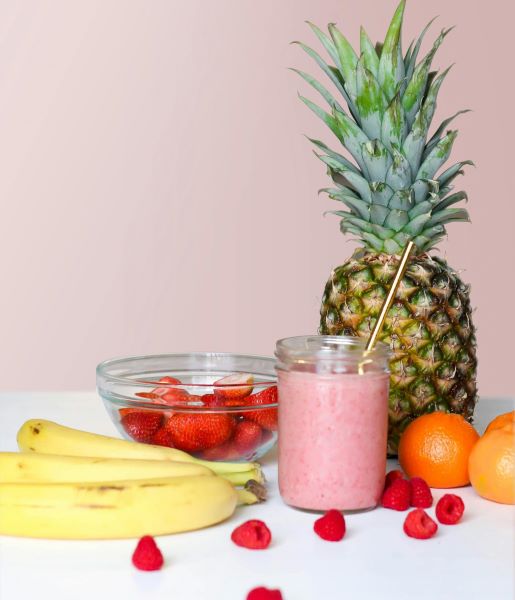
A Guide to the Nutrients and Benefits of Fruit
Les CalvertA - Z of Fruit
A Comprehensive Guide to the Nutrients and Benefits of Eating Fruit
Fruits are nature's nutritional powerhouses, packed with essential vitamins, minerals, antioxidants, and fibre that are crucial for maintaining good health. They are naturally low in calories and high in nutrients, making them an integral part of a balanced diet. This guide explores the key nutrients and health benefits of major fruits, providing a deeper understanding of how they contribute to overall wellness.
1. Apples- Nutrients: Apples are a rich source of dietary fibre (especially pectin), vitamin C, potassium, and various antioxidants like quercetin and catechins.
- Heart Health: The soluble fibre in apples helps lower LDL cholesterol levels, reducing the risk of heart disease. Potassium aids in maintaining healthy blood pressure.
- Digestive Health: Pectin, a type of soluble fibre in apples, acts as a prebiotic, supporting the growth of beneficial gut bacteria and aiding digestion.
- Antioxidant Protection: Quercetin, a potent antioxidant, combats inflammation and oxidative stress, potentially reducing the risk of chronic conditions like cancer and neurodegenerative diseases.
- Nutrients: Bananas are high in potassium, vitamin B6, vitamin C, and dietary fibre. They also contain magnesium, manganese, and small amounts of other B vitamins.
- Energy Boost: Bananas provide a quick source of energy due to their natural sugars (glucose, fructose, and sucrose) and fibre, making them ideal for pre- or post-workout snacks.
- Heart Health: Potassium helps regulate blood pressure by balancing sodium levels in the body, which is essential for heart health.
- Mood Support: Vitamin B6 is involved in the production of neurotransmitters like serotonin, which plays a key role in mood regulation and mental health.
- Nutrients: Oranges are an excellent source of vitamin C, fibre, folate, potassium, and a variety of antioxidants, including flavonoids like hesperidin.
- Immune Support: Vitamin C is essential for the production and function of white blood cells, which are crucial for a strong immune system.
- Skin Health: Vitamin C is also vital for collagen synthesis, which helps maintain skin elasticity and repair damage from UV exposure and pollution.
- Heart Health: The combination of fibre, potassium, and flavonoids in oranges helps lower blood pressure, reduce cholesterol levels, and protect against heart disease.
- Nutrients: Berries are loaded with antioxidants (like anthocyanins and ellagic acid), vitamin C, vitamin K, fibre, and manganese.
- Brain Health: Antioxidants in berries help reduce oxidative stress and inflammation in the brain, which can improve cognitive function and delay age-related cognitive decline.
- Heart Health: Berries have been shown to lower LDL cholesterol levels, reduce blood pressure, and improve arterial function, all of which contribute to a healthier heart.
- Digestive Health: High fibre content in berries supports healthy digestion and helps prevent constipation, while promoting a balanced gut microbiome.
- Nutrients: Grapes are rich in vitamins C and K, potassium, and powerful antioxidants like resveratrol and flavonoids.
- Heart Health: Resveratrol, found in the skin of red grapes, supports cardiovascular health by improving blood vessel function, reducing blood clot formation, and lowering cholesterol.
- Antioxidant Protection: The high levels of antioxidants in grapes help protect cells from damage caused by free radicals, reducing the risk of chronic diseases such as cancer and heart disease.
- Skin Health: Vitamin C and K in grapes support collagen formation and wound healing, while antioxidants protect the skin from oxidative damage.
- Nutrients: Pineapples are rich in vitamin C, manganese, and bromelain, an enzyme known for its anti-inflammatory and digestive benefits.
- Digestive Health: Bromelain helps break down proteins in the digestive tract, improving digestion and reducing bloating. It may also alleviate symptoms of irritable bowel syndrome (IBS).
- Immune Support: The high vitamin C content in pineapples boosts the immune system by enhancing the function of white blood cells and acting as a potent antioxidant.
- Anti-Inflammatory: Bromelain has anti-inflammatory properties that may help reduce swelling, bruising, and pain after surgery or injury, and it’s also used in managing conditions like arthritis.
- Nutrients: Mangoes are packed with vitamins A, C, and E, as well as folate, potassium, and a variety of antioxidants, including zeaxanthin and beta-carotene.
- Eye Health: The high vitamin A content in mangoes is crucial for maintaining healthy vision, preventing night blindness, and reducing the risk of age-related macular degeneration.
- Skin Health: Vitamins C and E in mangoes promote healthy skin by supporting collagen production and protecting against sun damage and oxidative stress.
- Immune Support: The abundance of vitamin C in mangoes strengthens the immune system and enhances the body’s ability to fight infections.
- Nutrients: Papayas are high in vitamin C, folate, fibre, and the enzyme papain, which has digestive and anti-inflammatory properties.
- Digestive Health: Papain helps break down tough protein fibres in food, making it easier to digest, while fibre supports regular bowel movements and gut health.
- Immune Support: Vitamin C in papayas boosts immune function, helping the body resist infections and illnesses.
- Skin Health: The antioxidants and enzymes in papayas help reduce the signs of aging, such as wrinkles and sagging skin, by promoting collagen production and skin repair.
- Nutrients: Cherries are rich in vitamins C and A, fibre, potassium, and potent antioxidants like anthocyanins and melatonin.
- Anti-Inflammatory: Anthocyanins in cherries have powerful anti-inflammatory effects that can help reduce symptoms of arthritis and gout.
- Sleep Aid: Melatonin, a hormone found in cherries, helps regulate sleep-wake cycles and may improve sleep quality, especially for those with insomnia.
- Heart Health: Potassium in cherries helps maintain normal blood pressure levels, reducing the risk of heart disease.
- Nutrients: Peaches and nectarines are rich in vitamins A, C, E, and K, as well as dietary fibre and potassium.
- Skin Health: The combination of vitamins A and C in peaches and nectarines helps promote healthy skin by supporting collagen production and protecting against sun damage.
- Digestive Health: Fibre in these fruits aids digestion, prevents constipation, and supports a healthy gut microbiome.
- Eye Health: Vitamin A is crucial for maintaining good vision, preventing night blindness, and reducing the risk of age-related macular degeneration.
- Nutrients: Pears are high in dietary fibre, vitamin C, potassium, and small amounts of other essential nutrients like copper and vitamin K.
- Digestive Health: Pears are one of the highest-fibre fruits, with both soluble and insoluble fibre that aids digestion, prevents constipation, and supports a healthy gut microbiome.
- Heart Health: The fibre and potassium in pears help lower cholesterol levels, regulate blood pressure, and reduce the risk of heart disease.
- Weight Management: The high fibre content in pears promotes satiety, helping with weight management by reducing overall calorie intake.
- Nutrients: Kiwis are an excellent source of vitamins C and K, folate, potassium, fibre, and antioxidants like lutein and zeaxanthin.
- Immune Support: With more vitamin C per serving than an orange, kiwis are a powerful immune booster, helping to protect the body against infections.
- Digestive Health: The soluble fibre in kiwis aids digestion, prevents constipation, and helps maintain a healthy gut microbiome.
- Skin Health: The antioxidants in kiwis, particularly vitamin C and E, protect the skin from damage, promote collagen production, and help reduce the signs of aging.
- Nutrients: Pomegranates are rich in vitamin C, potassium, fibre, and unique antioxidants like punicalagins and anthocyanins.
- Heart Health: Pomegranates have been shown to improve heart health by lowering blood pressure, reducing cholesterol levels, and protecting the arteries from plaque buildup.
- Anti-Inflammatory: The antioxidants in pomegranates help reduce inflammation in the body, which is linked to a lower risk of chronic diseases such as heart disease and cancer.
- Cancer Prevention: Some studies suggest that pomegranates may help prevent the growth of certain types of cancer cells, particularly breast and prostate cancer, due to their high antioxidant content.
- Nutrients: Watermelons are high in vitamins A, C, and B6, potassium, and the antioxidant lycopene.
- Hydration: With over 90% water content, watermelon is excellent for keeping the body hydrated, which is essential for overall health and kidney function.
- Heart Health: Lycopene, a powerful antioxidant in watermelon, has been shown to reduce cholesterol levels and lower blood pressure, promoting cardiovascular health.
- Muscle Recovery: Citrulline, an amino acid found in watermelon, helps reduce muscle soreness and improve recovery after exercise, making it an ideal post-workout snack.
- Nutrients: Citrus fruits are rich in vitamin C, fibre, folate, potassium, and various phytonutrients like flavonoids and limonoids.
- Immune Support: The high vitamin C content in citrus fruits is crucial for immune function, helping the body fight off infections and heal wounds.
- Digestive Health: The soluble fibre in citrus fruits aids digestion, helps regulate blood sugar levels, and promotes a healthy gut.
- Skin Health: Vitamin C and antioxidants in citrus fruits support collagen production, helping maintain skin elasticity and prevent signs of aging.
- Nutrients: Avocados are rich in healthy monounsaturated fats, fibre, potassium, vitamins C, E, K, and B6, as well as folate and magnesium.
- Heart Health: The monounsaturated fats in avocados are heart-healthy, helping to lower bad cholesterol (LDL) levels while increasing good cholesterol (HDL).
- Skin and Hair Health: Healthy fats, along with vitamins C and E, promote glowing skin, reduce signs of aging, and strengthen hair.
- Digestive Health: The fibre in avocados supports a healthy digestive system by promoting regular bowel movements and feeding beneficial gut bacteria.
- Nutrients: Plums are rich in vitamins C and K, fibre, and antioxidants like phenols, while prunes (dried plums) are particularly high in dietary fibre and vitamin K.
- Digestive Health: Prunes are well-known for their ability to promote regular bowel movements due to their high fibre content and natural laxative effect.
- Bone Health: Vitamin K and antioxidants in plums and prunes support bone density, reducing the risk of osteoporosis.
- Heart Health: The fibre and antioxidants in plums and prunes contribute to cardiovascular health by lowering cholesterol levels and reducing inflammation.
- Nutrients: Melons are high in vitamins A and C, potassium, and water content, along with smaller amounts of folate, magnesium, and fibre.
- Hydration: The high water content in melons makes them excellent for hydration, which is essential for maintaining healthy skin, kidneys, and overall body function.
- Skin Health: Vitamin A in melons helps maintain healthy skin by supporting cell growth and repair, while vitamin C promotes collagen production.
- Immune Support: Vitamin C in melons boosts immune function, helping the body resist infections and recover from illness.
- Nutrients: Coconuts are rich in healthy fats (especially medium-chain triglycerides or MCTs), fibre, and minerals like manganese, copper, and selenium.
- Energy Boost: MCTs in coconut provide a quick source of energy that is easily metabolized by the body, making it a popular choice for athletes and those on ketogenic diets.
- Digestive Health: The fibre in coconut supports digestive health by promoting regular bowel movements and feeding beneficial gut bacteria.
- Heart Health: While coconuts are high in saturated fat, the unique MCTs have been shown to support heart health by improving cholesterol levels and reducing the risk of heart disease.
Incorporating a wide variety of fruits into your daily diet ensures you receive a comprehensive array of essential nutrients that support overall health and well-being. Each fruit offers a unique combination of vitamins, minerals, antioxidants, and fibre, which contribute to everything from heart health and immune support to digestive wellness and radiant skin. By making fruits a regular part of your diet, you can enjoy the many benefits they offer while satisfying your taste buds with nature's delicious bounty.

